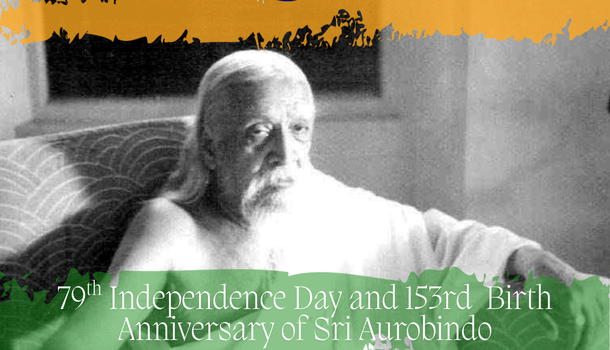
This passage reflects on the significance of 15th August, India’s Independence Day, highlighting not only the nation’s freedom but also the spiritual legacy of Sri Aurobindo, born in 1872. Although he was initially a freedom fighter who inspired awakening through his fiery words, Aurobindo’s deeper journey was inward, focusing on spiritual revolution after a profound divine experience. He moved to Pondicherry, creating an ashram and envisioning Auroville as a symbol of unity beyond divisions. His teachings emphasize that true freedom extends beyond political independence to inner liberation from fear and ignorance, inspiring us to reflect on the deeper meaning of freedom and listen to his enduring spiritual message.
15th August – A Birthday That Echoes with the Soul of a Nation. When we wake up on 15th August, the air feels different. The streets are filled with flags, children rehearse their patriotic songs, and the tricolour flutters proudly in the wind. For most of us, it’s the day we celebrate India’s freedom. But quietly, without much fanfare, it is also the birthday of a man whose life and dreams still shape the soul of this country — Sri Aurobindo. Born in Kolkata in 1872, Aurobindo Ghose didn’t follow the usual path of a freedom fighter. He grew up in England, spoke flawless English, and could read Latin and Greek. Yet, when he came back to India, something in him stirred. The pain of a nation under foreign rule shook him deeply. His words, fiery and fearless, started to awaken people — not just to fight for freedom, but to believe in it. But destiny had something more in store for him. During a year in solitary prison, surrounded by silence and uncertainty, he had a lifechanging experience — a deep, unshakable sense of the Divine’s presence. From that moment, his journey turned inward. He left politics, not because he stopped caring for India, but because he saw another kind of revolution — one that began in the soul. He moved to Pondicherry, where, with The Mother — his spiritual collaborator, Mirra Alfassa — he began a different kind of work. They built an ashram, not as an escape from life, but as a place to live it more deeply. Here, seekers from around the world came to learn, grow, and transform. Later, they dreamt of Auroville, a town where people could live beyond the divisions of religion, nationality, and ego. On 15th August 1947, when India finally became free, Sri Aurobindo was 75. In a special message that day, he called independence “a gift of the Divine’s workings” — but he reminded us it was only the first step. His dream was for India to be a light for the whole world, not just politically free, but spiritually awake. Even today, his writings — from the soul-stirring Savitri to the thought-shaping The Life Divine — don’t just inform us. They make us stop, reflect, and ask: What does freedom really mean? Maybe it’s not just about borders and flags. Maybe it’s also about breaking the inner chains — fear, anger, ignorance — that hold us back. we stand under the open sky this Independence Day, watching our flag dance in the wind, maybe we can take a quiet moment for him. Not just to remember, but to listen. Because Sri Aurobindo still speaks — in silence, in hope, and in the questions he leaves behind.
As he once wrote, “True knowledge is not attained by thinking. It is what you are; it is what you become.”
By ANSHU TRIPATHI , crafting thoughts into timeless lines

